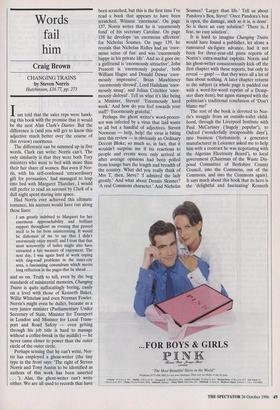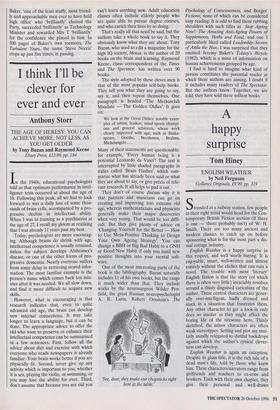Words fail him
Craig Brown
CHANGING TRAINS by Steven Norris Hutchinson, £16.77, pp. 273 I am told that the sales reps were hawk- ing this book with the promise that it would be the next Alan Clark's Diaries. But the difference is (and you will get to know this adjective much better over the course of this review) enormous.
The difference can be summed up in five words. Clark can write; Norris can't. The only similarity is that they were both Tory ministers who went to bed with more than their fair share of women. But even if Nor- ris, with his self-confessed 'extraordinary gift for persuasion,' had managed to leap into bed with Margaret Thatcher, I would still prefer to read an account by Clark of a dull night spent staring into space.
Had Norris ever achieved this ultimate romance, his account would have run along these lines: I am greatly indebted to Margaret for her enormous approachability and brilliant support throughout an evening that proved itself to be far from uninteresting. It would be dishonest of me to say that I didn't enormously enjoy myself, and I trust that that most noteworthy of ladies might also have extracted a fair measure of enjoyment. The next day, I was again hard at work coping with ring-road problems in the inner-city area, a fascinating conundrum which merits long reflection in the pages that lie ahead .. .
and so on. Truth to tell, even by the bog standards of ministerial memoirs, Changing Trains is quite suffocatingly boring, easily on a level with those of Kenneth Baker, Willie Whitelaw and even Norman Fowler. Norris's might even be duller, because as a very junior minister (Parliamentary Under Secretary of State, Minister for Transport in London and Minister for Local Trans- port and Road Safety — even getting through his job title is hard to manage without a coffee-break in the middle) — he never came closer to power than the outer circle of the outer circle.
Perhaps sensing that he can't write, Nor- ris has employed a ghost-writer (the tiny type in the front says: The right of Steven Norris and Tony Austin to be identified as authors of this work has been asserted '). Alas, the ghost-writer can't write either. We are all used to records that have been scratched, but this is the first time I've read a book that appears to have been scratched. Witness 'enormous'. On page 137, Norris writes that he is 'enormously fond' of his secretary Caroline. On page 138 he develops 'an enormous affection' for Nicholas Soames. On page 139, he reveals that Nicholas Ridley had an 'enor- mous sense of fun' and was 'enormously happy in his private life'. And so it goes on: a girlfriend is `enormously attractive', John Prescott is 'enormously popular', both William Hague and Donald Dewar 'enor- mously impressive', Brian Mawhinney `enormously shrewd', Lord Hailsham 'enor- mously smug', and Julian Critchley 'enor- mously disloyal'. Tell us what it's like being a Minister, Steven! 'Enormously hard work.' And how do you feel towards your staff? 'Enormously grateful.'
Perhaps the ghost writer's word-proces- sor was infected by a virus that laid waste to all but a handful of adjectives. Steven Normous — help, help! the virus is biting into this review — is obviously an Ordinary Decent Bloke; so much so, in fact, that it wouldn't surprise me if his reactions to people and events were only arrived at after average opinions had been polled from lounge bars the length and breadth of the country. What did you really think of Mrs T, then, Steve? 'I admired the lady greatly,' And what about Dennis Skinner? `A real Commons character.' And Nicholas Soames? 'Larger than life.' Tell us about Pandora's Box, Steve! 'Once Pandora's box is open, the damage, such as it is, is done'. So is there an easy solution? 'There is, I fear, no easy solution'.
It is hard to imagine Changing Trains would have found a publisher, let alone a rumoured six-figure advance, had it not been for three-year-old press reports of Norris's extra-marital exploits. Norris and his ghost-writer conscientiously kick off the first chapter with these reports, but only to reveal — gasp! — that they were all a lot of fuss about nothing. A later chapter returns to the subject (a whole page is padded out with a word-for-word reprint of a Demp- ster diary item), but again stamped with the politician's traditional conclusion of 'Don't blame me!'
The rest of the book is devoted to Nor- ris's struggle from an outside-toilet child- hood, through the Liverpool Institute with Paul McCartney (`hugely popular'), to Oxford (`wonderfully irresponsible days'), into business (`fortunately, a generator manufacturer in Leicester asked me to help him with a contract he was negotiating with the Algerian Electricity Board'), to local government (Chairman of the Waste Dis- posal Committee of Berkshire County Council, into the Commons, out of the Commons, and into the Commons again). It says much about this book that its hero is the 'delightful and fascinating' Kenneth Baker, 'one of the least stuffy, most friend- ly and approachable men ever to have held high office' who 'brilliantly' chaired the Party, succeeded 'brilliantly' as Technology Minister and rewarded Mrs T 'brilliantly' for the confidence she placed in him. In 500 pages of Baker's own memoirs, The Turbulent Years, the name 'Steve Norris' crops up just five times, in passing.



















































































 Previous page
Previous page